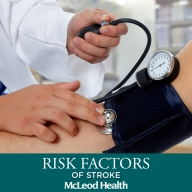A Stroke Snapshot: Risks, Signs and Treatments
Medically Reviewed by
Deborah L. Kirby, MD
McLeod Neurologist
RISK FACTORS
A stroke occurs in one of two cases. In the first, blood is blocked from going to the brain by a clot that plugs an artery carrying oxygenated blood to the brain. In the second, an artery in the brain bursts creating pressure on the brain.
“A number of vascular health issues affect how the blood flows, which creates a greater risk of stroke,” says McLeod Neurologist, Dr. Deborah Kirby.
- High blood pressure can cause an artery to burst or cause hardening and narrowing of the arteries. To control your blood pressure be sure to take your blood pressure medications as prescribed.
- Diabetes is a big risk factor for stroke. You need to manage your diabetes, lose weight and exercise. A healthy diet positively affects all three of those issues.
- Atrial fibrillation describes an irregular heartbeat. It can cause pooling of blood in the heart that thickens and turns into a blood clot. If you have atrial fibrillation, take your blood thinner according to your doctor’s direction. This helps avoid pooling and clotting.
- Cholesterol nearly one in three American adults have high cholesterol. Too much cholesterol puts you at risk for heart disease and stroke. Studies have shown that statin medications used to lower cholesterol, in certain people, reduce the risk of heart attacks and strokes by about 25 to 35 percent. To reduce the amount of cholesterol in the body take medication, eat a healthy diet, get frequent exercise and don’t smoke.
Smoking is a singularly bad risk. Even if you have no other risk factors, smoking independently increases your danger of a stroke. Quitting smoking is a single, conscious decision that can significantly lower your stroke risk.
A woman with migraines, taking HRT and smoking, puts herself at significantly increased risk. Talk to your gynecologist about alternatives to hormone replacement or treatment for migraines.
SPOTTING THE SIGNS
Use the acronym BE FAST, which stands for Balance, Eyes, Face, Arm, Speech and Time.
You may experience a loss of Balance or your Eyes have blurred vision.
In the mirror, you see that your Face is weak on one side or droops.
Your Arm feels heavy or suddenly goes numb. Slurred Speech, difficulty in speaking, and problems thinking of words or speech that comes out as gibberish are all signs.
An acute stroke hits with a sudden onset of symptoms. It’s serious and can progress quickly to weakness or blindness on one side, or total language problems.
TREATING YOUR STROKE
Call 911 and go to the hospital immediately for an evaluation of your stroke. Even if the symptoms disappear after a short time, you need to be seen, because having a mini-stroke (also called a Transient Ischemic Attack or TIA) means you are at increased risk for stroke.
At the hospital, you’ll have a CT scan, blood work, and a physical examination. This helps distinguish between an Ischemic stroke or a Hemorrhagic stroke. It is important to know which type of stroke it is to be able to determine the treatment plan.
ACTION TO TAKE
If you feel you are starting to have a stroke, call 911. Don’t try to drive yourself. The “T” in FAST is Time. The faster you receive treatment the greater the chance that physicians can limit the damage and return you to everyday activities.
You may also find these articles useful:
Know the Different Types of Strokes
Symptoms of Strokes
-
McLEOD REGIONAL MEDICAL CENTER FLORENCE
843-777-2000 -
McLEOD DARLINGTON
843-777-1100 -
McLEOD DILLON
843-774-4111 -
McLEOD LORIS
843-716-7000 -
McLEOD SEACOAST
843-390-8100 -
McLEOD CHERAW
843-537-7881 -
McLEOD CLARENDON
803-433-3000



-
McLEOD REGIONAL MEDICAL CENTER FLORENCE
843-777-2000 -
McLEOD DARLINGTON
843-777-1100 -
McLEOD DILLON
843-774-4111 -
McLEOD LORIS
843-716-7000 -
McLEOD SEACOAST
843-390-8100 -
McLEOD CHERAW
843-537-7881 -
McLEOD CLARENDON
803-433-3000
 Find a Doctor
Find a Doctor  Locations
Locations  Services
Services 